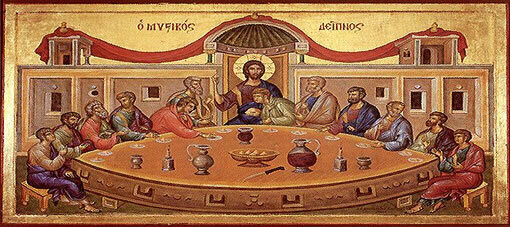MYSTICAL BENEDICTION
Before COVID, there were already casual Fridays, and in companies where it was mainly young people every day was casual. Even nicer restaurants are often full of casually dressed people. Now people may never dress for work when they work from home. This has affected the church as well. Few men wear suits to church, let alone dress clothes. Women rarely wear dresses. In many churches, the pastors do not vest in historic vestments or even preach from the pulpit. After all, if God is your good buddy, He surely would want you to be casual and relaxed in His presence. During the last year, the Sacrament fell victim to even more of the casualness of society as the abomination of disposable cups was taken one step further to a self-contained unit of a small wine cup packaged with some bread. This package could also be handled by one individual and then cast aside into the trash.
In view of these things, it is time for a little reminder. The New Testament uses the term “Mysteries” to refer to the Sacraments that Christ has instituted for His Church on earth. Cyril of Alexandria (376-444 AD) frequently referred to the Lord’s Supper as a “mystical benediction.” Notice that he has combined the mystery of God’s gift to the Church with the term “Benediction” which refers to the proclamation of a blessing. Indeed, the Mystery of the Lord’s Supper is only understood through the Words which Christ has proclaimed at the institution of this Sacrament. Chrysostom writes that in the mysteries we must not look at the things set before us, but trust His Word which is of higher authority than our thoughts and senses. He then continues:
How many now say, I would wish to see His form, the mark, His clothes, His shoes. Lo! thou seest Him, Thou touchest Him, thou eatest Him. And thou indeed desirest to see His clothes, but He giveth Himself to thee not to see only, but also to touch and eat and receive within thee. Let then no one approach it with indifference, no one faint-hearted, but all with burning hearts, all fervent, all aroused. For if Jews standing, and having on their shoes and their staves in their hands, ate with haste, much more oughtest thou to be watchful. For they indeed were to go forth to Palestine, wherefore also they had the garb of pilgrims, but thou art about to remove unto Heaven. [Homilies on Matthew 82:4, NPNF 10:495]
This is nothing to be casual about. Do we not sing in the Liturgy the song of Isaiah, “Holy, Holy, Holy”? In the Blessed Sacrament, the Holy God who sent His Holy Son in flesh and blood, strengthens us by His Holy Spirit to draw us ever nearer to the Eternal Feast in Heaven. Solomon cautions us, “Guard your steps when you go to the house of God. To draw near to listen is better than to offer the sacrifice of fools, for they do not know that they are doing evil.” (Ecclesiastes 5:1)
Why are we so formal in the Divine Service: bowing, kneeling, wearing vestments, etc.? It is, as Chrysostom reminds us, that Christ comes to us so that we might see, touch, eat and receive Him as He prepares us to be removed into Heaven. Our Lutheran Fathers remind us that this is a great mystery, “a secret which ought and must be used with great circumspection and fear, not because the absent body and blood of Christ are signified, but rather because, as Chrysostom says, the Word teaches and faith regards it as certain that what is present in the cup of the Lord is precisely what flowed from the side of the Lord.” (Apology of the Book of Concord, p. 237) In a world where everything is casual and often very sloppy, the Church reminds Herself that Christ gives us His own Holy Body and Blood to eat upon this altar that we might eat and drink for the forgiveness of sins. That is His Word that is sure and certain. This is not the vain imagining of men which would make us ask how can these things be, but the infallible words of Christ. These things must be believed precisely because they are Mysteries. Faith then receives the Mystical Benediction imparted to all those who eat and drink believing in Christ’s Promise.
This is not something to be received in disposable cups or throwaway containers for these are the Holy Things of God Himself according to His own Word. All that we do is to confess this. The silver or gold sacramental vessels remind us that this is the greatest feast of any on earth. The pastor is clothed in white with a royal looking chasuble as a servant of Christ who has received Holy Orders to administer the Blessed Sacrament according to the Word of Christ. The pastor kneels to adore the Sacrament because he believes the Word of Christ that this is the Body and Blood of the Son of God upon the altar. In this confession, we are reminded that through the personal union of God and Man in the one Christ, we are fed not only His spiritual Body, but His real Flesh and Blood, for the day of the Resurrection. Then, we come to the altar and kneel before the Son of God as He gives us the great gift of the forgiveness of sins, that our weak, doubting minds might cling by faith to the certainty of His Word of Truth. Our ears hear the Word of Benediction of our Lord, “This is My Body,” “This is My Blood,” “given and shed for you for the forgiveness of sins.” Truly, this is not something of indifference, but causes hearts to burn with joy at the tender mercy of our God who has visited His people.


